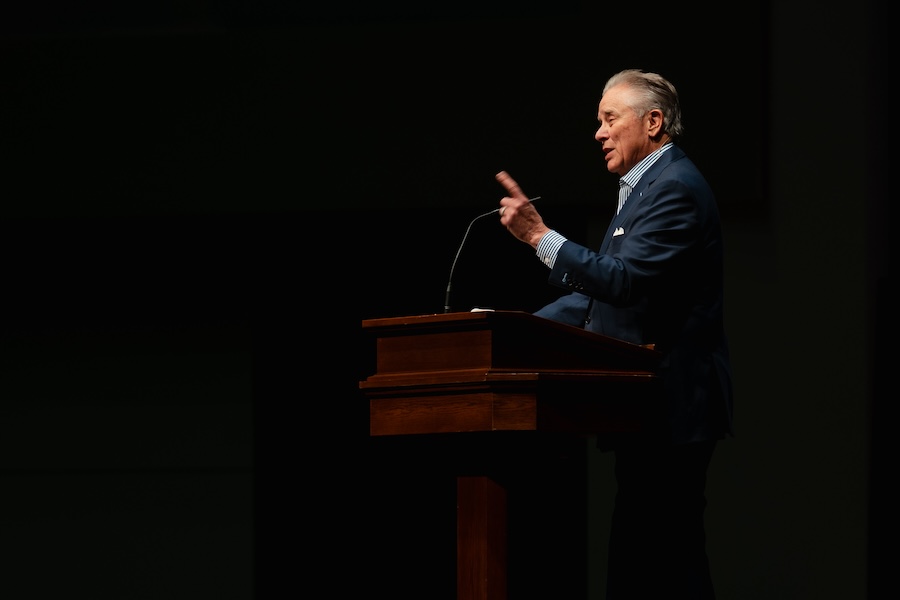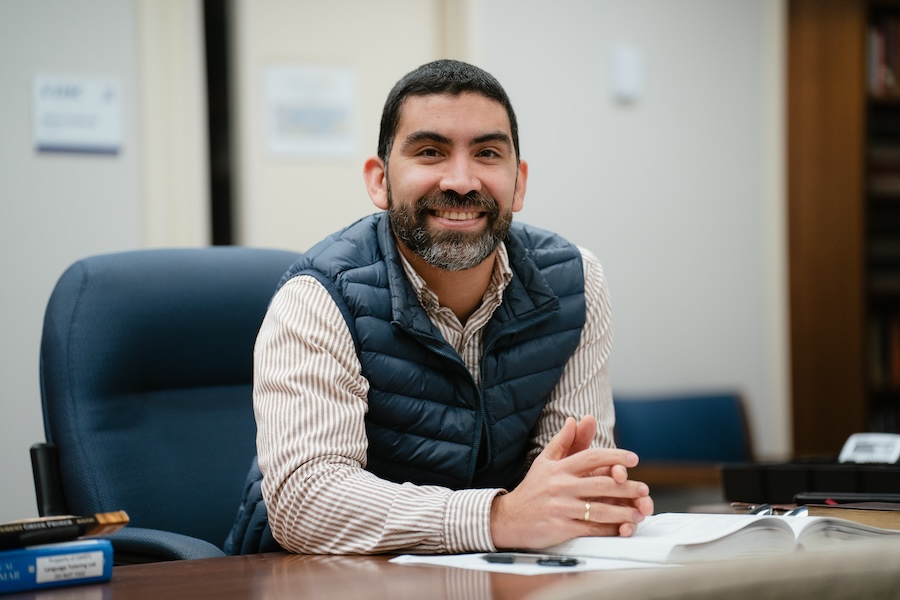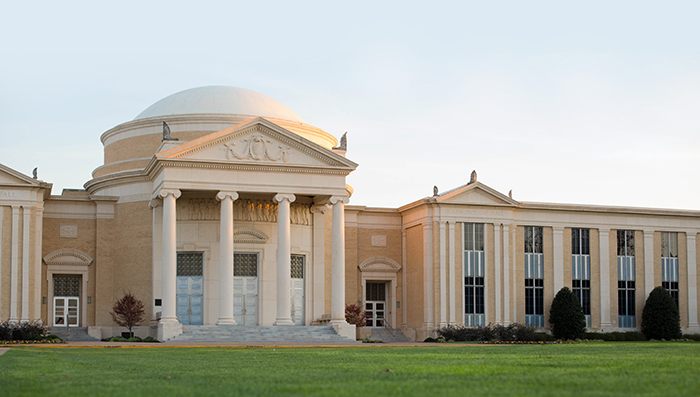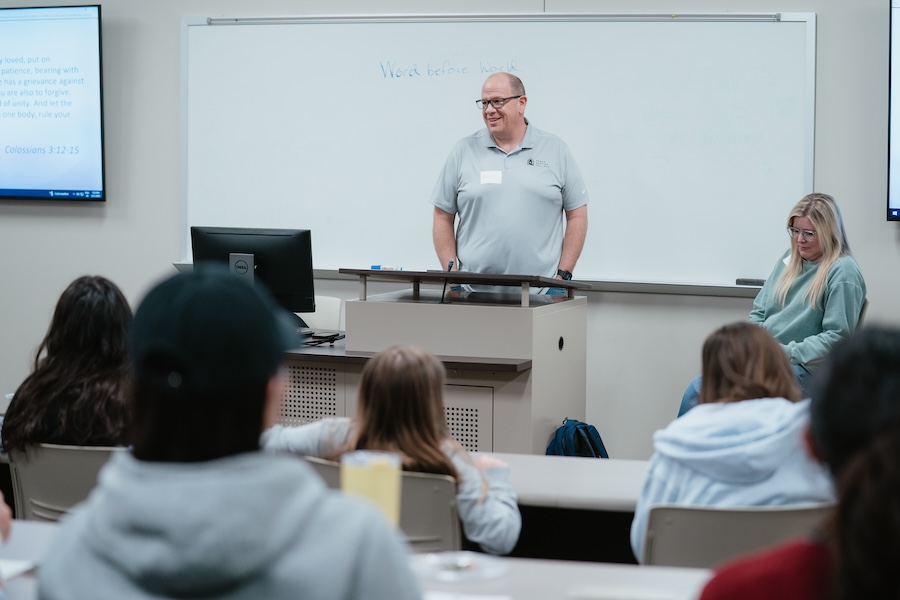Hawkins: true worship results in Christians telling others about Jesus

Christians will know that they truly have worshiped God when they understand God’s holiness, recognize their helplessness, and are driven to tell others about Jesus, Chancellor O.S. Hawkins preached to the Southwestern Baptist Theological Seminary community gathered for the Chancellor’s Chapel, Jan. 23.
Preaching from Isaiah 6:1-9, Hawkins expounded on the importance of worship in the community of believers, an idea which President David Dockery had touched on in Tuesday’s convocation chapel service.
Hawkins, who also serves as senior professor of pastoral ministry and evangelism and holds the L.R. Scarborough Chair of Evangelism (“Chair of Fire”), began by positing a question: “How do you know that you’ve truly worshiped?”
“We have worship services, we hand out worship programs, we have a worship leader, we have a worship team, often. We sing worship songs, we experience worship,” he elaborated, before again asking, “But how do we know that we have truly worshiped?”
He spoke on the New Testament definition, saying that all are to fall prostrate before the Lord as demonstrated by John in Revelation. In Isaiah 6, heavenly beings were calling out to one another in worship of the Lord on His throne.
Hawkins said there are three indicators of true worship seen in one’s upward relationship with God, inward relationship with self, and outward relationship with others.
First, the worshipper recognizes the Lord’s holiness during true worship, not thinking of Him as a casual friend but as the almighty Creator, set apart. While some have changed the Gospel to be based on man’s self-fulfillment, Hawkins pointed out that the New Testament is about self-denial, the importance of putting one’s sinful life behind them and following in the steps of Jesus Christ. Those actions are a result of recognizing God’s position as holy.
“Worship is not about you, it’s about Him. Worship is Christ-centered, not man-centered,” Hawkins said.
In Isaiah, Hawkins pointed out the chapter begins with the death of King Uzziah, prompting the idea that the book was written out of crisis in a time of turmoil and uncertainty after the death of a good king who had ruled for decades.
“The earthly throne was empty, but He was seated on the throne,” Hawkins stated, adding genuine worship can often come as a result of trial. “God is in control. The eyes of the Lord still run to and fro over the world to show Himself strong on behalf of those whose hearts are fixed on Him. He’s not abdicated His throne.”
Hawkins said once a worshipper has seen the holiness of God, they will also recognize their own helplessness as the second indicator of true worship. When humbled by the holiness of God, a true worshipper will consider themselves in introspection and not look at others in judgment.
“If you can really see the holy God, you will see yourself for who you really are,” Hawkins said.
He pointed out the reactions of Peter, Paul, and John upon seeing God’s holiness, falling to the ground and feeling unworthy in light of His majesty. He pointed out the ever-evolving humility of Paul throughout his epistles, going from declaring himself an apostle, to calling himself the least of the apostles, and eventually the “chief of all sinners” before his death. Through Paul, Hawkins illustrated the internal humility that should come from truly seeing the holiness of God in worship, and the confession of sin that follows.
“You’ll know you’ve worshipped when you come to a place of seeing God in His holiness, seeing yourself in your own helplessness, and coming to that place where you’ve confessed your sin before God and gotten free of sin,” Hawkins said.
On the third evidence of outward expression, Hawkins said true worship leads to seeing others’ hopelessness. He talked about Isaiah’s immediate surrender to the Lord upon seeing Him and hearing Him, asking to be used by Him in His mission. Hawkins talked about the importance of surrender as it indicates a giving of oneself completely to the Lord.
“True worship will always lead us to an evangelistic heart,” Hawkins stated. “To be interested in the things that God is interested in.”
He spoke on the will of Jesus, saying it is to seek and save those who are lost. When one truly worships, Hawkins said their eyes are opened to all those around them who are lost without hope. True worship makes oneself yearn to reach the lost people and bring them into the light of the Lord. Hawkins called the congregation to surrender all, echoing that old hymn, and encouraged them to truly worship that they might be reinvigorated from the sight of the Lord..
“Perhaps your ‘Uzziah’ has died,” Hawkins proposed. “Or that someone in which you put so much trust, has died. Maybe you’ve moved here from across the world or across the continent to study here, it seems like your ‘Uzziah’ has died. … God has not abdicated His throne. Look. He is still seated on the throne, high and lifted up.”
“How will you know if you’ve worshiped?” Hawkins asked. “And if you lead people to worship, how will you know they have worshiped? You will see God in His holiness. It will lead you to see yourself in your helplessness. Coming clean before Him, you will see others in their hopelessness and be about the business Jesus was about: seeking to save the lost.”
He quoted Isaiah’s account of God, asking “Whom shall I send, who will go forth?”
“You’ll know you’ve worshipped when you respond, ‘Here am I, every piece of me; I surrender. Send me,’” Hawkins concluded. “And He will tell you the same thing He told Isaiah, ‘Ok, go and tell these people.”
Hawkins graduated with his Master of Divinity from Southwestern 50 years ago, later he earned his Doctor of Philosophy from the seminary. He served as pastor at various churches, including First Baptist Church of Fort Lauderdale and First Baptist Church of Dallas, before becoming the president and CEO of Guidestone Financial Resources. Hawkins retired from Guidestone in 2022 after leading the Southern Baptist entity for 25 years.
Hawkins’ entire message can be viewed here.
Chapel is held every Tuesday and Thursday morning at 11 a.m. (CT) in MacGorman Chapel on the campus of Southwestern Seminary and TBC. Chapel may be viewed live at swbts.live.



